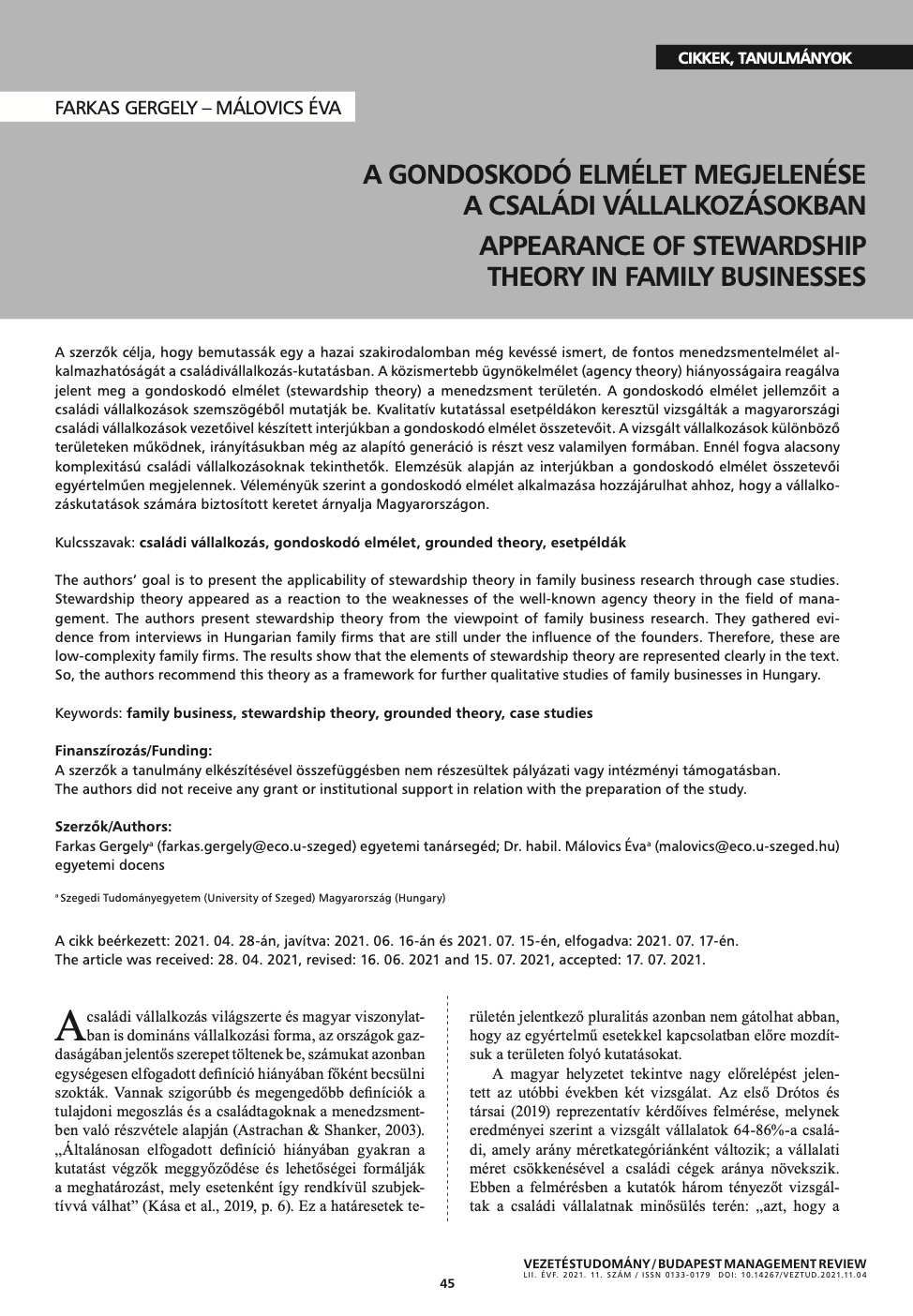A gondoskodó elmélet megjelenése a családi vállalkozásokban
DOI:
https://doi.org/10.14267/VEZTUD.2021.11.04Kulcsszavak:
családi vállalkozás, gondoskodó elmélet, grounded theory, esetpéldákAbsztrakt
A szerzők célja, hogy bemutassák egy a hazai szakirodalomban még kevéssé ismert, de fontos menedzsmentelmélet alkalmazhatóságát a családivállalkozás-kutatásban. A közismertebb ügynökelmélet (agency theory) hiányosságaira reagálva jelent meg a gondoskodó elmélet (stewardship theory) a menedzsment területén. A gondoskodó elmélet jellemzőit a családi vállalkozások szemszögéből mutatják be. Kvalitatív kutatással esetpéldákon keresztül vizsgálták a magyarországi családi vállalkozások vezetőivel készített interjúkban a gondoskodó elmélet összetevőit. A vizsgált vállalkozások különböző területeken működnek, irányításukban még az alapító generáció is részt vesz valamilyen formában. Ennél fogva alacsony komplexitású családi vállalkozásoknak tekinthetők. Elemzésük alapján az interjúkban a gondoskodó elmélet összetevői egyértelműen megjelennek. Véleményük szerint a gondoskodó elmélet alkalmazása hozzájárulhat ahhoz, hogy a vállalkozáskutatások számára biztosított keretet árnyalja Magyarországon.
Letöltések
Hivatkozások
Astrachan, J. H., & Shanker, M. C. (2003). Family Businesses’ Contribution to the U.S. Economy: A Closer Look. Family Business Review, 16(3), 211–219. https://doi.org/10/ghtqcd
Block, P. (2013). Stewardship (2nd ed.). Oakland, CA: Berrett-Koehler Publishers, Inc.
Charmaz, K. (2006). Constructing grounded theory a practical guide through qualitative analysis. Thousand Oaks, CA: Sage. http://public.eblib.com/choice/publicfullrecord.aspx?p=585415
Chrisman, J. J. (2019). Stewardship Theory: Realism, Relevance, and Family Firm Governance. Entrepreneurship Theory and Practice, 43(6), 1051–1066. https://doi.org/10/ggz8sb
Chrisman, J. J., Chua, J. H., & Litz, R. (2003). A unified systems perspective of family firm performance: An extension and integration. Journal of Business Venturing, 18(4), 467–472. https://doi.org/10/c2wrv3
Csákné Filep, J. (2012a). A családi vállalkozások pénzügyi sajátosságai. Vezetéstudomány, 43(9), 15–24. https://doi.org/10.14267/VEZTUD.2012.09.02
Csákné Filep, J. (2012b). Családi vállalkozások – fókuszban az utódlás. Budapest: Corvinus Egyetem. http://phd.lib.uni-corvinus.hu/660/
Davis, J. H., Allen, M. R., & Hayes, H. D. (2010). Is Blood Thicker Than Water? A Study of Stewardship Perceptions in Family Business. Entrepreneurship Theory and Practice, 34(6), 1093–1116. https://doi.org/10/bk88qc
Davis, J. H., Schoorman, F. D., & Donaldson, L. (1997). Toward a Stewardship Theory of Management. Academy of Management Review, 22(1), 20–47. https://doi.org/10/ckrcwn
Donaldson, L. (1990). The Ethereal Hand: Organizational Economics and Management Theory. The Academy of Management Review, 15(3), 369. https://doi.org/10/chhpxm
Donaldson, L., & Davis, J. H. (1991). Stewardship Theory or Agency Theory: CEO Governance and Shareholder Returns. Australian Journal of Management, 16(1), 49–64. https://doi.org/10/b6s6rh
Drótos, G., Wieszt, A., Meretei, B., & Vajda, É. (2019).
Családi vállalkozások Magyarországon. Kutatási jelentés a 2017—18-as családi vállalkozási felmérésről (Kutatási jelentés). Budapest: Corvinus Center of Family Business.
European Comission. (2009). Report – Expert Group on Family Business between 2007-2009. Luxembourg: European Commission Enterprise and Industry Directorate-General. https://ec.europa.eu/docsroom/documents/10388?locale=hu
Gómez-Mejía, L. R., Haynes, K. T., Núñez-Nickel, M., Jacobson, K. J. L., & Moyano-Fuentes, J. (2007). Socio-emotional Wealth and Business Risks in Family-controlled Firms: Evidence from Spanish Olive Oil Mills. Administrative Science Quarterly, 52(1), 106–137. https://doi.org/10/gf83pt
Hernandez, M. (2012). Toward an Understanding of the Psychology of Stewardship. Academy of Management Review, 37(2), 172–193. https://doi.org/10/gfs5kt
Horváth, D., & Mitev, A. (2015). Alternatív kvalitatív kutatási kézikönyv. Budapest: Alinea Kiadó.
James, H. S. (1999). Owner as Manager, Extended Horizons and the Family Firm. International Journal of the Economics of Business, 6(1), 41–55. https://doi.org/10/cz8bmk
Kása, R., Radácsi, L., & Csákné Filep, J. (2019). Családi vállalkozások definíciós operacionalizálása és hazai arányuk becslése a KKV-szektoron belül. Statisztikai Szemle, 97(2), 146–174. https://doi.org/10/ghtqcc
Kucsera, C. (2008). Megalapozott elmélet: Egy módszertan fejlődéstörténete. Szociológiai Szemle, 18(3), 92–108. https://szociologia.hu/dynamic/SzocSzemle_2008_3_092_108_KucsereCs.pdf
Lamberts, E. (Ed.). (1997). Christian democracy in the European Union: (1945/1995); proceedings of the Leuven Colloquium, 15 - 18 November 1995. Leuven: Leuven Univ. Press.
Le Breton-Miller, I., & Miller, D. (2009). Agency vs. Stewardship in Public Family Firms: A Social Embeddedness Reconciliation. Entrepreneurship Theory and Practice, 33(6), 1169–1191. https://doi.org/10/d984v2
Löhde, A. S. K., Campopiano, G., & Calabrò, A. (2020). Beyond agency and stewardship theory: Shareholder– manager relationships and governance structures in family firms. Management Decision, 59(2), 390–405. https://doi.org/10.1108/MD-03-2018-0316
Miller, D., Le Breton-Miller, I., & Scholnick, B. (2007). Stewardship vs. Stagnation: An Empirical Comparison of Small Family and Non-Family Businesses. Journal of Management Studies, 45(1), 51–78. https://doi.org/10/b7s9kg
Neubaum, D. O., Thomas, C. H., Dibrell, C., & Craig, J. B. (2017). Stewardship Climate Scale: An Assessment of Reliability and Validity. Family Business Review, 30(1), 37–60. https://doi.org/10/ghppbr
Pearson, A. W., & Marler, L. E. (2010). A Leadership Perspective of Reciprocal Stewardship in Family Firms. Entrepreneurship Theory and Practice, 34(6), 1117–1124. https://doi.org/10/bb4r3s
Pieper, T. M. (2010). Non solus: Toward a psychology of family business. Journal of Family Business Strategy, 1(1), 26–39. https://doi.org/10/ftftp4
Sallay, V., & Martos, T. (2018). A Grounded Theory (GT) módszertana. Magyar Pszichológiai Szemle, 73(1), 11–28. https://doi.org/10/ghtqb9
Schein, E. H. (1983). The role o f the founder in creating organizational culture. Organizational Dynamics, 12(1), 13–28. https://doi.org/10.1016/0090-2616(83)90023-2
Simon, A., Marquès, P., Bikfalvi, A., & Dolors Muñoz, M. (2012). Exploring value differences across family firms: The influence of choosing and managing complexity. Journal of Family Business Strategy, 3(3), 132–146. https://doi.org/10/gg98gn
Sirmon, D. G., & Hitt, M. A. (2003). Managing Resources: Linking Unique Resources, Management, and Wealth Creation in Family Firms. Entrepreneurship Theory and Practice, 27(4), 339–358. https://doi.org/10/fqq963
Wade-Benzoni, K. A. (2002). A Golden Rule over Time: Reciprocity in Intergenerational Allocation Decisions. Academy of Management Journal, 45(5), 1011–1028. https://doi.org/10/dfbfwd
Welsh, D. H. B., Memili, E., Rosplock, K., Roure, J., & Segurado, J. L. (2013). Perceptions of entrepreneurship across generations in family offices: A stewardship theory perspective. Journal of Family Business Strategy, 4(3), 213–226. https://doi.org/10/ghc3t9

Downloads
Megjelent
Hogyan kell idézni
Folyóirat szám
Rovat
License
Copyright (c) 2021 Vezetéstudomány / Budapest Management Review

This work is licensed under a Creative Commons Attribution 4.0 International License.
Authors assign copyright to Vezetéstudomány / Budapest Management Review. Authors are responsible for permission to reproduce copyright material from other sources.

